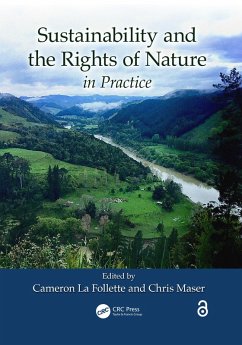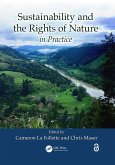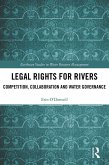Sustainability and the Rights of Nature in Practice (eBook, PDF)
Redaktion: La Follette, Cameron; Maser, Chris
56,95 €
56,95 €
inkl. MwSt.
Sofort per Download lieferbar

28 °P sammeln
56,95 €
Als Download kaufen

56,95 €
inkl. MwSt.
Sofort per Download lieferbar

28 °P sammeln
Jetzt verschenken
Alle Infos zum eBook verschenken
56,95 €
inkl. MwSt.
Sofort per Download lieferbar
Alle Infos zum eBook verschenken

28 °P sammeln
Sustainability and the Rights of Nature in Practice (eBook, PDF)
Redaktion: La Follette, Cameron; Maser, Chris
- Format: PDF
- Merkliste
- Auf die Merkliste
- Bewerten Bewerten
- Teilen
- Produkt teilen
- Produkterinnerung
- Produkterinnerung

Bitte loggen Sie sich zunächst in Ihr Kundenkonto ein oder registrieren Sie sich bei
bücher.de, um das eBook-Abo tolino select nutzen zu können.
Hier können Sie sich einloggen
Hier können Sie sich einloggen
Sie sind bereits eingeloggt. Klicken Sie auf 2. tolino select Abo, um fortzufahren.

Bitte loggen Sie sich zunächst in Ihr Kundenkonto ein oder registrieren Sie sich bei bücher.de, um das eBook-Abo tolino select nutzen zu können.
This book elucidates and examines how the Rights of Nature paradigm is being enacted in law, and brought to bear in real situations around the world to create sustainability for all life. Written by scholars and policymakers, it discusses the challenges and opportunities in shifting structures of governance to an ecological-law based paradigm.
- Geräte: PC
- mit Kopierschutz
- eBook Hilfe
Andere Kunden interessierten sich auch für
![Sustainability and the Rights of Nature in Practice (eBook, ePUB) Sustainability and the Rights of Nature in Practice (eBook, ePUB)]() Sustainability and the Rights of Nature in Practice (eBook, ePUB)56,95 €
Sustainability and the Rights of Nature in Practice (eBook, ePUB)56,95 €![Environmental Constitutionalism in the Anthropocene (eBook, PDF) Environmental Constitutionalism in the Anthropocene (eBook, PDF)]() Environmental Constitutionalism in the Anthropocene (eBook, PDF)44,95 €
Environmental Constitutionalism in the Anthropocene (eBook, PDF)44,95 €![Routledge Handbook of International Environmental Law (eBook, PDF) Routledge Handbook of International Environmental Law (eBook, PDF)]() Routledge Handbook of International Environmental Law (eBook, PDF)60,95 €
Routledge Handbook of International Environmental Law (eBook, PDF)60,95 €![Legal Rights for Rivers (eBook, PDF) Legal Rights for Rivers (eBook, PDF)]() Erin O'DonnellLegal Rights for Rivers (eBook, PDF)44,95 €
Erin O'DonnellLegal Rights for Rivers (eBook, PDF)44,95 €![Environmental Justice in India (eBook, PDF) Environmental Justice in India (eBook, PDF)]() Gitanjali GillEnvironmental Justice in India (eBook, PDF)47,95 €
Gitanjali GillEnvironmental Justice in India (eBook, PDF)47,95 €![Law, Climate Emergency and the Australian Megafires (eBook, PDF) Law, Climate Emergency and the Australian Megafires (eBook, PDF)]() Nicole RogersLaw, Climate Emergency and the Australian Megafires (eBook, PDF)23,95 €
Nicole RogersLaw, Climate Emergency and the Australian Megafires (eBook, PDF)23,95 €![The Anthropocene (eBook, PDF) The Anthropocene (eBook, PDF)]() Peter D. BurdonThe Anthropocene (eBook, PDF)21,95 €
Peter D. BurdonThe Anthropocene (eBook, PDF)21,95 €-
-
-
This book elucidates and examines how the Rights of Nature paradigm is being enacted in law, and brought to bear in real situations around the world to create sustainability for all life. Written by scholars and policymakers, it discusses the challenges and opportunities in shifting structures of governance to an ecological-law based paradigm.
Dieser Download kann aus rechtlichen Gründen nur mit Rechnungsadresse in A, B, BG, CY, CZ, D, DK, EW, E, FIN, F, GR, HR, H, IRL, I, LT, L, LR, M, NL, PL, P, R, S, SLO, SK ausgeliefert werden.
Produktdetails
- Produktdetails
- Verlag: Taylor & Francis eBooks
- Seitenzahl: 436
- Erscheinungstermin: 30. September 2019
- Englisch
- ISBN-13: 9780429000393
- Artikelnr.: 57818339
- Verlag: Taylor & Francis eBooks
- Seitenzahl: 436
- Erscheinungstermin: 30. September 2019
- Englisch
- ISBN-13: 9780429000393
- Artikelnr.: 57818339
- Herstellerkennzeichnung Die Herstellerinformationen sind derzeit nicht verfügbar.
Cameron La Follette has a law degree from Columbia University School of Law, a Masters in Psychology from New York University, and a Bachelor's in Journalism from the University of Oregon. Her initial environmental activism (1978-1982) was with Oregon nonprofit organizations that focused on preserving ancient forests on Federal public lands managed by the U.S. Forest Service and U.S. Bureau of Land Management to protect salmon habitat, clean drinking water, and forest ecosystems. She served on the Salem, OR, Planning Commission for three years (2002-05) applying the City of Salem's land use and zoning ordinances to many situations ranging from residential housing to industrial and commercial properties. Since 2010, she has been Executive Director of an environmental and land use nonprofit that focuses on protecting the natural resources of the Oregon coast, working with residents to oppose ill-advised land use projects, and helping maintain livable coastal communities. She is the co-author, with Chris Maser, of Sustainability and the Rights of Nature: An Introduction, published by CRC Press in 2017. She was the lead author on Oregon's Manila Galleon, a special issue of Oregon Historical Quarterly published in June 2018, and has also written several articles on Oregon coastal history for the online Oregon Encyclopedia. Chris Maser spent over 25 years as a research scientist in natural history and ecology in forest, shrub steppe, subarctic, desert, coastal, and agricultural settings. Trained primarily as a vertebrate zoologist, he was a research mammalogist in Nubia, Egypt, (1963-1964) with the Yale University Peabody Museum Prehistoric Expedition and a research mammalogist in Nepal (1966-1967), where he participated in a study of tick-borne diseases for the U.S. Naval Medical Research Unit #3 based in Cairo, Egypt. He conducted a three-year (1970-1973) ecological survey of the Oregon Coast for the University of Puget Sound, Tacoma, Washington. He was a research ecologist with the U.S. Bureau of Land Management for thirteen years--the first seven (1974-1981) studying the biophysical relationships in rangelands in southeastern Oregon and the last six (1982-1987) studying old-growth forests in western Oregon. He also spent a year as a landscape ecologist with the U.S. Environmental Protection Agency (1990-1991). He is an independent author as well as an international lecturer, facilitator in resolving environmental conflicts, vision statements, and sustainable community development. He is also an international consultant in forest ecology and sustainable forestry practices. He has written or edited over 290 publications, including 43 books.
Introduction: What Rights of Nature Is and What It Must Include. Rights of Nature: Acting Towards Land in a Sacred Manner. Small Scale Paradigm Changes Add to the Rights of Nature Mosaic. Definitions of Difficult Terms. Philosophical and Legal Considerations. Human Rights to a Sustainable Environment Is Not Enough. Ecological Law, Governance and Ethics. Restoration is Not Rights of Nature - Unless It Is Systemic. Rights of Nature in Practice: Examples and Beginnings. The Whanganui River, Personhood and New Zealand Leadership. Ecuador and Bolivia: Problems on the Ground. The Ganges Watershed and Legal Personhood. Sustainable Nations, Rights of Nature in Practice if Not Law. Nepal: Case Law and Changes. Bhutan: A Sustainable Kingdom. Belize: A Nature-Based Economy. Rights of Nature in Practice: Challenges and Opportunities. The Problem and Promise of American Communities and Rights of Nature. Indigenous Cultivation, Native Lands and Rights of Nature: A Network of Regional Opportunities. Rights of Nature in Practice: Energy and Infrastructure. Road Maps for the Switch to Small Scale Solar. Removing Elwha Dam, Other Dams and Energy Infrastructure. The Rights of Nature Mosaic. Permaculture & Organic Farming. Caledonian Forest of Scotland: Large Scale Landscape Restoration Focusing on Nature's Requirements. Grasslands, Agriculture and Cattle: Maintaining Nature's Rights. Wild Caught Foods, Especially Ocean Foods, and Rights of Nature. Creating and Enforcing Rights of Nature Around the World. Leadership and Respect for Life in Southeast Asia. International Trade Changes for Sustainability. Conclusion.
Introduction: What Rights of Nature Is and What It Must Include. Rights of Nature: Acting Towards Land in a Sacred Manner. Small Scale Paradigm Changes Add to the Rights of Nature Mosaic. Definitions of Difficult Terms. Philosophical and Legal Considerations. Human Rights to a Sustainable Environment Is Not Enough. Ecological Law, Governance and Ethics. Restoration is Not Rights of Nature - Unless It Is Systemic. Rights of Nature in Practice: Examples and Beginnings. The Whanganui River, Personhood and New Zealand Leadership. Ecuador and Bolivia: Problems on the Ground. The Ganges Watershed and Legal Personhood. Sustainable Nations, Rights of Nature in Practice if Not Law. Nepal: Case Law and Changes. Bhutan: A Sustainable Kingdom. Belize: A Nature-Based Economy. Rights of Nature in Practice: Challenges and Opportunities. The Problem and Promise of American Communities and Rights of Nature. Indigenous Cultivation, Native Lands and Rights of Nature: A Network of Regional Opportunities. Rights of Nature in Practice: Energy and Infrastructure. Road Maps for the Switch to Small Scale Solar. Removing Elwha Dam, Other Dams and Energy Infrastructure. The Rights of Nature Mosaic. Permaculture & Organic Farming. Caledonian Forest of Scotland: Large Scale Landscape Restoration Focusing on Nature's Requirements. Grasslands, Agriculture and Cattle: Maintaining Nature's Rights. Wild Caught Foods, Especially Ocean Foods, and Rights of Nature. Creating and Enforcing Rights of Nature Around the World. Leadership and Respect for Life in Southeast Asia. International Trade Changes for Sustainability. Conclusion.







